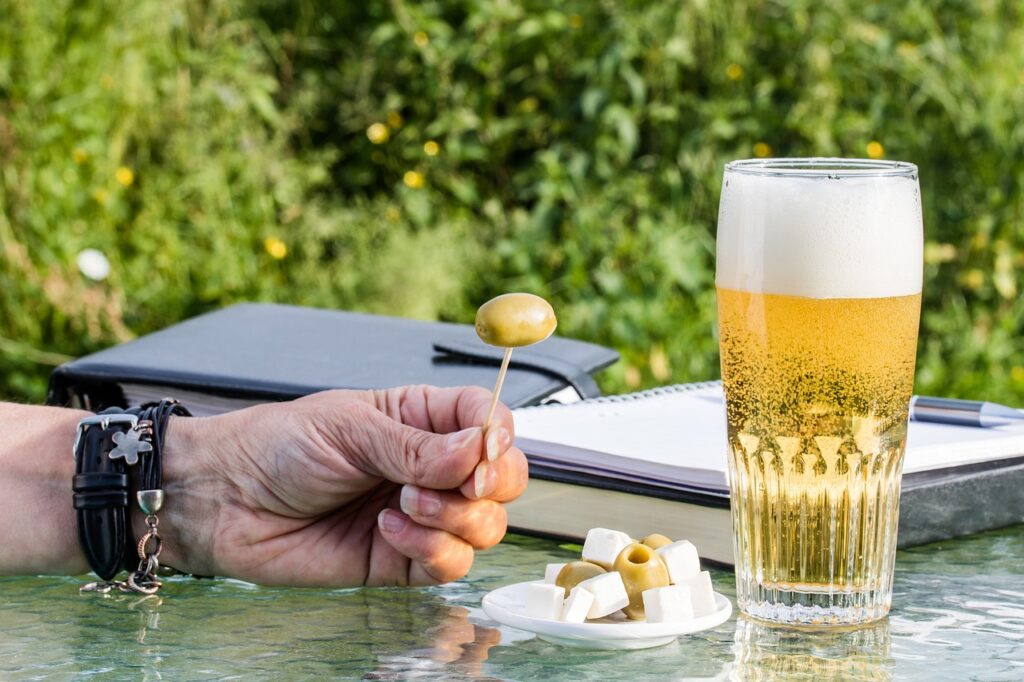Common Food Preservative in Beer and Cheese May Wreak Havoc on Your Gut
 By Study Finds
By Study Finds
Key Findings:
- A common food additive in many foods kills off healthy bacteria in the gut
- “Lantibiotics” are in various products like beer and cheese
- Losing healthy bacteria can lead to drug-resistant bacteria spreading
That aged cheddar, spicy sausage, or tangy salad dressing you love likely owes its lengthy shelf life to special ingredients called “lantibiotics.” These natural antimicrobials kill dangerous pathogens, preventing foodborne illnesses. However, new research reveals they may also indiscriminately wipe out gut-friendly bacteria that keep us healthy.
“It seems that lantibiotics and lantibiotic-producing bacteria are not always good for health,” explains Dr. Zhenrun “Jerry” Zhang, a postdoctoral researcher at the University of Chicago studying these preservatives’ impacts, in a statement.
His recent study rang alarm bells about the potential “bad influence” of these common additives.
For centuries, people have added antibacterial substances to food as natural preservatives. These ingredients, like salt, sugar, and vinegar, stem problematic microbial growth. More recently, processed foods have incorporated synthetic versions with sci-fi names like sorbates and benzoates.
Natural Blaze is Google-Free — We Need Your Support
Contribute Just $1 Per Month at Patreon to Aid the Cause of Health Freedom
Lantibiotics represent the latest generation of antimicrobial add-ons. The most popular is nisin, found in everything from beer to cheese dips. First discovered in cows’ milk, nisin comes from special bacteria that also reside inside human digestive tracts. There, these microbes secrete tiny proteins called peptides that “share structural similarities with antibiotics,” Zhang explains. Hence, their portmanteau name: lanthipeptide antibiotics.
Besides warding off contaminated dairy, nisin-producing species crowd out infectious bugs in the gut itself. And there lies the rub. While obliterating baddies like Salmonella and Listeria, could lantibiotics also wipe out entire regiments of microbes that keep our digestive system humming?
“This study is one of the first to show that gut commensals are susceptible to lantibiotics, and are sometimes more sensitive than pathogens,” Zhang says.
Their experiments revealed that along with foodborne illnesses, these preservatives readily devastate many beneficial bacteria colonies living symbiotically inside us.
The microbiome refers to the army of microorganisms inhabiting places like our intestines. While we typically associate bacteria with disease, many germs are integral to human health.
Dr. Eric Pamer, Zhang’s research advisor and director of the Duchossois Family Institute at the University of Chicago, says it’s really a microbial world that we live in. There are more bacterial cells in and on our bodies than human cells.
The gut flora comprises over 70 percent of our immune system. They crowd out harmful pathogens, break down nutrients, produce essential vitamins, and even influence mood and behavior via the “gut-brain axis.” Tipping this delicate balance can wreak surprising havoc. For example, wiping out too many bacteria with broad antibiotics allows drug-resistant superbugs to gain a foothold.
“If too many commensals are indiscriminately killed off by antimicrobial food preservatives, opportunistic pathogenic bacteria might take their place and wreak havoc,” the researchers write, “a result no better than eating contaminated food in the first place.”
While lantibiotics like nisin prevent food poisoning when used judiciously, Zhang wanted to probe their impacts on our internal bacterial landscape. First, his team mined genetic databases, discovering six new lantibiotic varieties made by human gut microbes. Teaming up with chemists at the University of Illinois Urbana-Champaign, they then manufactured these peptides to test in the lab.
“Even though [lantibiotics] might be very effective in preventing food contamination, they might also have a greater impact on our human gut microbes,” Zhang says.
As anticipated, the lantibiotic panel killed illness-causing germs like E. coli and Salmonella at varying concentrations. More unexpectedly, they also readily eradicated scores of beneficial bacteria. To Zhang, these results raise red flags about lantibiotics’ potentially harmful effects inside the gut, even at low levels used in foods today.
“With the levels of lantibiotics currently present in food, it’s very probable that they might impact our gut health as well,” the study author says.
However, the researchers also highlighted these antimicrobials’ beneficial aspects for selectively targeting pathogens. Other studies show that specific combinations of bacteria, including lantibiotic producers, can protect against infections.
So which is it – friend or foe?
As usual, the dose makes the poison. The team now aims to decipher the structure of different lantibiotics to understand their killing capacities. Additionally, by studying gene prevalence across populations, they hope to clarify when gut bacteria pack a protective punch versus when they inflict damage.
Tweaking peptide structures or bacterial strains may allow harnessing lantibiotics’ pathogen-purging potential while sparing our microbiome.
In the meantime, consumers hoping to dodge digestive disruption from these common preservatives may need to examine labels more closely. That aged cheese may come at too high a cost for our bacterial troops holding the gastrointestinal fort. Moderation seems the best policy for lantibiotic-laced goods. Munching a few nisin-finished crackers likely poses little threat; downing a whole can of them may court consequences.
The study is published in the journal ACS Biology.
Source: Study Finds
StudyFinds sets out to find new research that speaks to mass audiences — without all the scientific jargon. The stories we publish are digestible, summarized versions of research that are intended to inform the reader as well as stir civil, educated debate.
View StudyFinds’s article archive
Image: Pixabay



